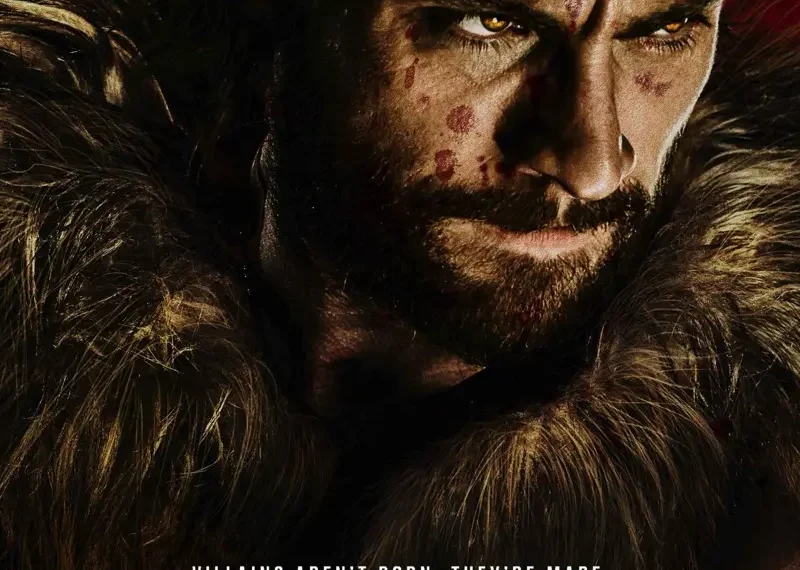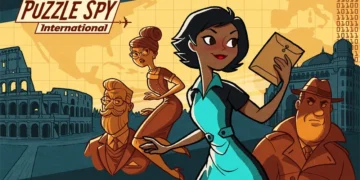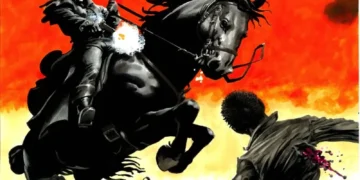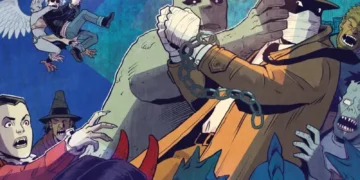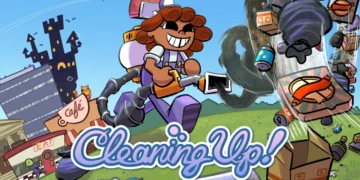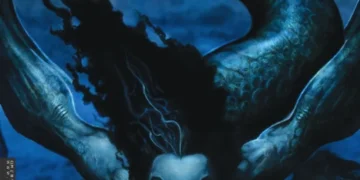Cast: Aaron Taylor-Johnson, Ariana DeBose, Fred Hechinger, Alessandro Nivola, Christopher Abbott, Russell Crowe
Genre: Superhero, Drama, Action, Thriller
Director: J.C. Chandor
In Irish Cinemas: 13th December 2024
Kraven the Hunter possesses the primal agility to scale sheer walls like a gorilla, snatch fish from streams with the precision of a bear, and sprint with the speed of a deer. But despite his larger-than-life prowess, there’s one feat this hulking antihero can’t pull off: starring in a compelling movie.
Aaron Taylor-Johnson takes on the role of Sergei Kravinoff, the titular character in Kraven the Hunter, Sony’s sixth misguided attempt to populate Spider-Man’s rogues’ gallery with standalone films—none of which feature the web-slinger himself. The film feels like a relic of an earlier era when superhero origin stories, no matter how contrived, dominated box offices and studios scrambled to mine even the most obscure intellectual properties for cinematic gold.
The screenplay, written by Richard Wenk, Art Marcum, and Matt Holloway, tries to piece together Kraven’s backstory but quickly loses focus; instead of digging deeper into its main character, the narrative veers off to set up origins for lesser-known villains like The Rhino and The Foreigner. When it seems like the movie might wrap things up, it shoehorns in Chameleon for a last-minute tease, implying another Kraven-centric sequel nobody asked for.
The film reveals Kraven’s unlikely transformation from Sergei Kravinoff, the son of a brutal Russian mobster, into a so-called “superhero” via a convoluted and unintentionally hilarious twist. During a safari in Ghana, Sergei is mauled by a lion and injected with a mystical botanical serum blended with the lion’s blood, tied to a vague tarot card mumbo jumbo. Clinically dead for three minutes, he miraculously revives, declaring himself a world-class hunter—a claim the film insists on without making it believable.

In the end, Kraven the Hunter is less a gripping origin tale and more a chaotic collage of missed opportunities and lacklustre villain setups. It’s a reminder that even a ferocious predator can stumble when chasing the wrong prey.
“Hunting people down is my speciality,” he declares confidently. Later, he goes even further: “I am the greatest hunter on the planet.” True to his word, he sets about assassinating villains, but his motivations remain murky. After all, stalking prey in the wild isn’t quite the same as infiltrating a high-security Siberian prison or taking down a cartel boss. The film struggles to bridge these scenarios into a coherent character arc.

Director J.C. Chandor’s approach feels loose and unfocused, leaving the narrative flabby and failing to discipline the performances. Many scenes end abruptly or meander without purpose. Additional villains crowd the story, detracting from what might have been a deeper exploration of masculinity and primal instincts. Meanwhile, the special effects don’t help matters, often veering into the absurd. One particularly jarring sequence—a fistfight between Kraven and The Rhino, who is inexplicably still wearing pants—elicited laughter at a recent screening, seemingly for all the wrong reasons.
A key issue is the vague and inconsistent depiction of Kraven’s abilities. His supposed mastery of animalistic hunting skills doesn’t square with the tools of his trade. Are there many predators in the wild wielding blow darts or stabbing foes in the trachea with a pen? The contradictions pile up: he despises poachers yet accessorises with a tooth necklace and dons a leather bomber jacket. These inconsistencies muddy the character, leaving the audience wondering what, if anything, makes him unique—or relatable.

Kraven’s eyes occasionally glow, but this flashy effect seems to serve no practical purpose beyond making Aaron Taylor-Johnson look more menacing as he smoulders shirtless at the camera. Among his powers is the ability to hyper-focus on distant objects, like identifying a discarded cigarette as a Turkish brand—hardly a skill likely to top any superhero’s wish list. The film also implies that Kraven has some form of animal communication, much like Aquaman, but if that’s true, he’s terrible at it. The animals barely tolerate him at best. A tiger even attacks him at one point, and you can’t blame the poor creature.
Kraven’s personality and moral compass seem shaped mainly in opposition to his father, a drug kingpin played by Russell Crowe. Crowe’s performance suggests he’s been bingeing episodes of The Adventures of Rocky & Bullwinkle to perfect his Russian accent. His character is a caricature of hyper-masculinity: a whisky-drinking, Tony Bennett-loving brute who sees compassion as weakness. He kills animals for sport, uses cocktail waitresses as human shields, refuses to pay ransoms because “that would make me soft,” and dismisses his wife’s suicide with a sneer: “She was weak.”

If Crowe teeters on the edge of parody, Alessandro Nivola dives headlong into it as a human-Rhino hybrid. His performance is so exaggerated—layered with a bizarre mix of murderous intent and psychotic humour—that he makes Crowe look downright restrained. The ridiculousness is compounded by his costume, which includes a small, stringed backpack that seems more comedic than serious.
Meanwhile, two otherwise talented actors—Fred Hechinger as Kraven’s younger brother and Ariana DeBose as his lawyer and ally—are left stranded in a film that feels increasingly aimless. Despite their efforts, the story spirals toward an unsatisfying conclusion. Is Kraven a hero, a villain, or something in between? The movie never really decides, and without Spider-Man as a foil, one has to wonder—what’s Kraven’s point?
Overall: 3/10

